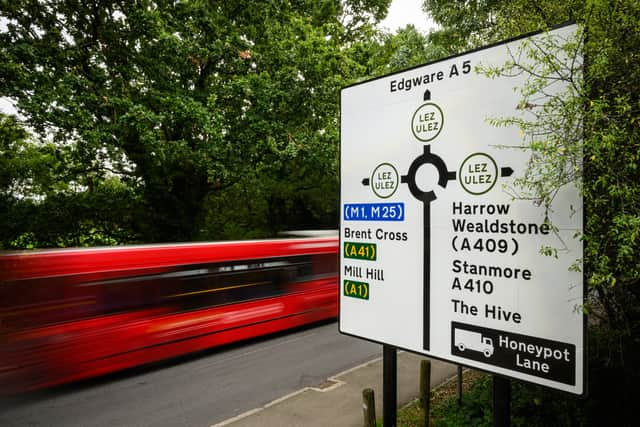ULEZ: TfL rakes in millions in first month of expansion, while cutting most-polluting vehicles by almost half
and live on Freeview channel 276
The expanded Ultra Low Emission Zone (ULEZ) has removed almost half of the most polluting vehicles from London’s roads in its first month, according to a new report.
Data published by City Hall and Transport for London (TfL) indicates that 95% of vehicles seen driving in London on an average day now meet the ULEZ emission standards. In outer London specifically, which was absorbed into the scheme on August 29, there has been a jump from 90.9% in June to 95.2% in September, an increase of more than four percentage points.
Advertisement
Hide AdAdvertisement
Hide AdIn total, 77,000, or 45%, fewer non-compliant cars or vans were seen on the capital’s roads on an average day last month, down from 170,000 to 93,000.
The report, which covers the first month of the ULEZ since it was expanded, shows that average compliance rates for cars in outer London were up to 96.4%, compared to 90% in November 2022 and 44% in 2017.
The London mayor, Sadiq Khan, and TfL have repeatedly stated the ULEZ expansion was devised to tackle air pollution in the capital, with all income to be ploughed directly back into the transport network. Mr Khan says that income will dry up in a few years as fewer vehicles are charged.
While City Hall and TfL have not released the amount received in charges in the first month of the expansion, it is being reported that the authority has raked in around £23 million from 57,200 drivers paying the £12.50 charge daily.
Advertisement
Hide AdAdvertisement
Hide AdA TfL spokesperson said the final cost will take a little longer to come through due to potential penalties for drivers who do not pay the correct charge, as well as subsequent reductions if resolved within 14 days.


Susan Hall, a Conservative London assembly member (AM) and mayoral candidate, calculates that if the rate of income for September continued up to October 30, more than £52m would have been raised by the extended zone since the end of August.
She said: "This proves once again that Sadiq Khan's ULEZ expansion is nothing but a tax grab.
“To take over £52 million from hardworking people, with no gain to air quality described anywhere in this report, shows how little he cares for Londoners.
Advertisement
Hide AdAdvertisement
Hide Ad“It is those on the lowest incomes who are suffering most from this disastrous charge. As mayor, I will scrap the ULEZ expansion on day one."
The majority of drivers of non-compliant vehicles (61%) paid charges over the month. The remainder were either eligible for a discount or exemption, or were issued a warning notice rather than a fine, to account for genuine mistakes in the first few weeks of the expanded zone. Between August 29 and September 25, 92,255 warning notices were issued overall.
The mayor’s £160m scrappage scheme has committed £121m as of the end of September, with money going to more than 37,200 applications.
Mr Khan said: “I’ve always said that the decision to expand the Ulez was very difficult, but a month on from the expansion we can already see that it is working.
Advertisement
Hide AdAdvertisement
Hide Ad“This new data shows 95% of vehicles seen driving in London on an average day now comply with our air quality standards – a 10 percentage point increase since I began to consult on the ULEZ expansion in May 2022. This will make a huge difference to the lives and health of Londoners.”
Henry Gregg, director of external affairs at Asthma and Lung UK, said: “It's extremely encouraging that the ULEZ expansion across all London boroughs in its first month has seen a reduction in the number of older, more polluting vehicles on an average day in London.
“These results help further demonstrate that schemes such as the ULEZ are instrumental in encouraging people to switch away from older and more polluting vehicles to cleaner forms of transport. The reduction in nitrogen dioxide levels in central London since the ULEZ was first introduced in 2019 shows the positive impact it has at cleaning up the air we breathe.
“The expansion has been a significant stride towards cleaner air for all of us, but particularly for those with living lung conditions. More than 60% of people with a lung condition in London live in the outer boroughs.
Advertisement
Hide AdAdvertisement
Hide Ad“Air pollution triggers symptoms including breathlessness, coughing and wheezing, and in more severe cases these flare-ups can result in hospitalisation. The expansion of the ULEZ across all London boroughs is a positive step towards all Londoners breathing cleaner air.”
Further reports are expected on the six-month and one-year marks since the scheme’s expansion, at which points details will be provided on its impacts on air pollution. City Hall has said it expects nitrogen oxide emissions from cars to decrease by 10% by the end of 2023.
Comment Guidelines
National World encourages reader discussion on our stories. User feedback, insights and back-and-forth exchanges add a rich layer of context to reporting. Please review our Community Guidelines before commenting.
